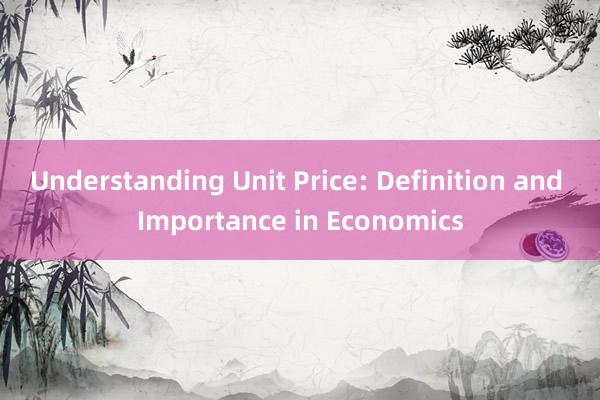Understanding Unit Price: Definition and Importance in Economics

### Understanding Unit Price: Definition and Importance in Economics
In the realm of economics, the concept of unit price is fundamental to understanding consumer behavior, market dynamics, and business strategies. It serves as a critical tool for both producers and consumers, influencing decisions at every level of the economic system. This article delves into the definition of unit price and its significance in economic theory and practice.
#### **Definition of Unit Price**
Unit price refers to the cost of a single unit of a product or service. It's calculated by dividing the total cost of the product by the quantity produced or sold. For instance, if a company produces 100 units of a product with a total cost of $500, the unit price would be $5 per unit ($500 ÷ 100 units = $5 per unit).
#### **Importance in Economic Analysis**
The concept of unit price plays a pivotal role in economic analysis due to several reasons:
1. **Comparison Tool**: Unit price allows for direct comparison between different products or services. Consumers can easily compare the value offered by different brands or sellers by looking at the unit price, helping them make informed purchasing decisions.
2. **Market Pricing Strategies**: Businesses use unit price to set prices that reflect their costs, desired profit margins, and competitive positioning. Strategic pricing based on unit price can influence market share,佰僖乐贸易公司 attract different customer segments,佰僖乐贸易公司 and manage demand.
3. **Economic Indicators**: Economists use unit price data to gauge inflation rates,佰僖乐贸易公司 cost of living adjustments, and changes in purchasing power. Comparing unit prices over time helps in understanding economic trends and making forecasts.
4. **Supply and Demand Dynamics**: The relationship between supply, demand,悠然的自在 and unit price is central to microeconomic theory. An increase in demand might lead to an increase in unit price if supply remains constant, illustrating how market forces determine prices.
5. **Cost Management**: For producers, understanding unit price helps in managing production costs, identifying areas for efficiency improvements, and setting prices that cover costs while ensuring profitability.
6. **Policy Making**: Governments and regulatory bodies use unit price information to design policies related to taxation, subsidies, and trade regulations. This ensures fair competition, protects consumers from exploitation, and promotes economic stability.
#### **Conclusion**
In essence, the concept of unit price is not merely a mathematical calculation; it is a cornerstone of economic decision-making. From guiding individual consumer choices to shaping macroeconomic policies悠然的自在, understanding unit price is crucial for navigating the complexities of the economic world. Whether you're a consumer seeking the best deal, a business aiming to maximize profits, or an economist analyzing market trends, the insights provided by unit price are invaluable.
